De Nederlandse dichter, vertaler en journalist Jan Eijkelboom werd op 1 maart 1926 in Ridderkerk geboren. Zie ook mijn blog van 1 maart 2008 en ook mijn blog van 28 februari 2008 en ook mijn blog van 1 maart 2009. en ook mijn blog van 1 maart 2010.
Schilderij, Duits, 19de eeuw
Dit is de liefde:
stilstand van de tijd.
De jongeling die met het meisje
in suizend onbewegen
de steile rots afspringt.
Tussen Teutoonse sparren heeft,
onhoorbaar tandenknarsend
boven een stalen baard,
de man te paard
– rivaal of vader –
het zwaard vergeefs ontbloot.
Zie ook de tanden van de honden
die doodstil grommen aan de rand.
Tanden en zwaard bereiken nooit het paar.
Het paar haalt nooit de grond.
Het blijft ontheven in een val
die op een dans gelijkt,
zo losjes houden zij elkander
bij de hand en bij
de smalle leest.
Dit is de tijd die blijft,
omdat er niets beweegt.
Slikkerveer
Hier hoorde mijn moeder in negentien vijf
het drinkwater aan komen ruisen
door de net aangelegde buizen.
Hier zag ik tegen de ochtendzon
mijn grootvader thuiskomen van de Noord
die hij heen-en-terug was overgezwommen
om zijn zestigste verjaardag te vieren.
Hier hoorde ik als jongen
een uiteenvallende briket ritselen
in het fornuis en dacht:
het klinkt als zilverpapier
dat terug tracht te komen
uit zijn verfrommeling.
Ik borg dat op voor later –
voor nu.
Voor wat hoort wat
Voor wat hoort wat
Een kind vraagt nooit
waarom, waartoe het toch
op aarde werd geworpen.
Daarom en niet omdat
het hulpeloos zou zijn
verzorgen wij het trouw,
vereren het als god.
Tot het de dood ontdekt
en een der onzen wordt.
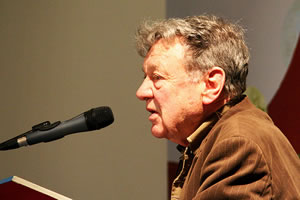
Jan Eijkelboom (1 maart 1926 – 28 februari 2008)
De Oostenrijkse schrijver, dichter en schilder Franzobel werd geboren op 1 maart 1967 in Vöcklabruck. Zie ook mijn blog van 1 maart 2007 en ook mijn blog van 1 maart 2008 en ook mijn blog van 1 maart 2009 en ook mijn blog van 1 maart 2010.
Leibenfrost/Herbst:
Wie Attila der Hunnenkönig,
daß die Blätter von den Bäumen
fallen, nun den Weg befaulen,
stumm, so ist er eingefallen,
wer jetzt noch keine Ahnung hat,
erfährt es nimmermehr.
Watschenmann:Kaltleutgebern/Täterprofil:
Lebte eher nicht in fester Partnerschaft,
also eher Einzelgängertyp, hat sich öfter
in der Nähe des Tatorts aufgehalten eher
oder dort vielleicht eher sogar gewohnt
war im Umgang mit verbalen Konflikten
eher ungeschickt, das heißt, er reagierte
eher aggressiv und rastete möglicherweise auch aus,
fiel durch ständiges Mitführen einer Bewaffnung
auf, trat eventuell als Tierquäler schon
in Erscheinung, ehe er jetzt
Täter geworden ist.
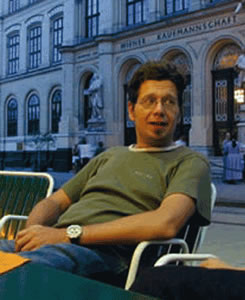
Franzobel (Vöcklabruck, 1 maart 1967)
De Engelse schrijver Jim Crace werd geboren op 1 maart 1946 in St. Albans, Hertfordshire. Zie ook mijn blog van 1 maart 2009. en ook mijn blog van 1 maart 2010.
Uit: Being Dead
„ For old times’ sake, the doctors of zoology had driven out of town that Tuesday afternoon to make a final visit to the singing salt dunes at Baritone Bay. And to lay a ghost. They never made it back alive. They almost never made it back at all.
They’d only meant to take a short nostalgic walk along the coast where they had met as students almost thirty years before. They had made love for the first time in these same dunes. And they might have made love there again if, as the newspapers were to say, ‘Death, armed with a piece of granite, had not stumbled on their kisses.’
They were the oddest pair, these dead, spreadeagled lovers on the coast: Joseph and Celice. Both had been teachers. He was director at the Tidal Institute, where he was noted for his coldness as much as for his brains. She was a part-time tutor at the university. Hardly any of their colleagues had ever seen them together, or visited them at home, let alone witnessed them touch. How unexpected, then, that these two, of all couples, should be found like this, without their underclothes, their heads caved in, unlikely victims of unlikely passions. Who would have thought that unattractive people of that age and learning would encounter sex and murder in the open air?
They paid a heavy price for their nostalgia.”
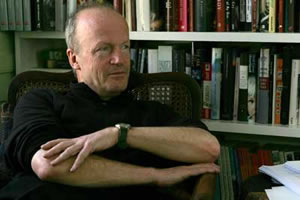
Jim Crace (St. Albans, 1 maart 1946)
De Zwitserse dichter, schrijver, cabaretier en liedjesmaker Franz Hohler werd geboren op 1 maart 1943 in Biel. Zie ook mijn blog van 1 maart 2009 en ook mijn blog van 1 maart 2010.
Vom richtigen Gebrauch der Zeit
Ich habe dich
heute morgen
nicht zum Bahnhof begleitet
ich hatte soviel zu tun
und brauchte sie dringend
die halbe Stunde.
Doch kaum warst du weg
saß ich da
und war
eine ganze Stunde lang traurig.
Solaruhren
Deine Uhr
neben meiner Uhr
auf dem Fenstersims
in der Vormittagssonne.
Gemeinsam
trinken sie Licht
damit sie stets
ihre Pflicht erfüllen können
uns anzuzeigen
wie wir langsam
zusammen älter werden
du und ich.
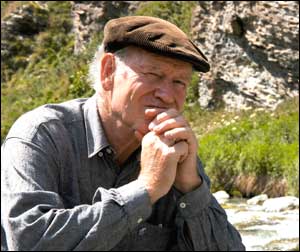
Franz Hohler (Biel, 1 maart 1943)
De Franstalige, Zwitserse schrijver Jacques Chessex werd geboren op 1 maart 1934 in Payerne. Zie ook mijn blog van 1 maart 2009 en ook mijn blog van 1 maart 2010.
Uit: Le simple préserve l’énigme
„J’ai vingt-six ans, lui trente-trois. A l’époque il est long, maigre, souple, rapide, rieur et même moqueur. Le teint coloré, tirant sur le carmin en fin de repas, le sourire inquiété d’une petite cassure à une incisive. Quarante-huit ans d’amitié sont nés là, je veux dire de mutuelle curiosité, d’histoires de livres, d’enfants, de maisons, de séparations, dans l’exigence légèrement consentie d’une communauté de sentiment sur nos lieux, nos origines, notre proximité, – une totale indépendance des esprits et des mouvements. L’un et l’autre sachant ce qu’écrire pèse de silence, de travail contre soi et le monde, et d’exposition aux coups.“
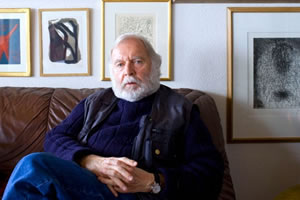
Jacques Chessex (1 maart 1934 – 9 oktober 2009)
De Britse schrijver Giles Lytton Strachey werd geboren op 1 maart 1880 in Londen. Zie ook mijn blog van 1 maart 2007 en ook mijn blog van 1 maart 2008 en ook mijn blog van 1 maart 2009 en ook mijn blog van 1 maart 2010.
Uit: Frederick the Great and Voltaire
„At the present time [October 1915] when it is so difficult to think of anything but of what is and what will be, it may yet be worthwhile to cast occasionally a glance backward at what was. Such glances may at least prove to have the humble merit of being entertaining: they may even be instructive as well. Certainly it would be a mistake to forget that Frederick the Great once lived in Germany. Nor is it altogether useless to remember that a curious old gentleman, extremely thin, extremely active, and heavily bewigged, once decided that, on the whole, it would be as well for him not to live in France. For, just as modern Germany dates from the accession of Frederick to the throne of Prussia, so modern France dates from the establishment of Voltaire on the banks of the Lake of Geneva. The intersection of those two momentous lives forms one of the most curious and one of the most celebrated incidents in history. To English readers it is probably best known through the few brilliant paragraphs devoted to it by Macaulay; though Carlyle’s masterly and far more elaborate narrative is familiar to every lover of The History of Friedrich II. Since Carlyle wrote, however, fifty years have passed. New points of view have arisen, and a certain amount of new material — including the valuable edition of the correspondence between Voltaire and Frederick published from the original documents in the Archives at Berlin — has become available. It seems, therefore, in spite of the familiarity of the main outlines of the story, that another rapid review of it will not be out of place.
Voltaire was forty-two years of age, and already one of the most famous men of the day, when, in
August 1736, he received a letter from the Crown Prince of Prussia. This letter was the first in a
correspondence which was to last, with a few remarkable intervals, for a space of over forty years. It was written by a young man of twenty-four, of whose personal qualities very little was known, and whose importance seemed to lie simply in the fact that he was heir- apparent to one of the secondary European monarchies.“
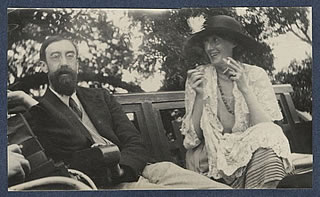
Lytton Strachey (1 maart 1880 – 21 januari 1932)
Hier met Virginia Woolf
Zie voor nog meer schrijvers van de 1e maart (en de 29e februari) ook mijn vorige blog van vandaag en eveneens mijn eerste blog van vandaag.

deze blog is een oase van nostalgie en overgeleverde schoonheid, een stil feest voor een lezer die niet kan spreken (anders breekt hij), elk geluid is stuitend, laat dit verder schuiven, ruisen elke dag, de wind verhuist nu (van de kust naar brussel), mompelt romenu